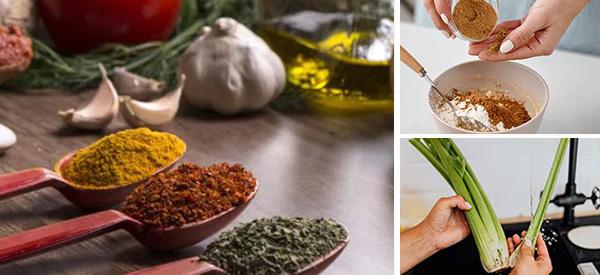
7 Natural Remedies To Reduce Blood Clots And The Risk Of Stroke
An ischemic stroke occurs when a blood clot blocks an artery to the brain. The blocked artery could not deliver oxygen-rich blood to the brain due to the blockage. Thus, the stroke occurs. Aside from an active and healthy lifestyle, there are other things we can do to help reduce the occurrence of blood clots. This, in turn, will lessen our risk of suffering from an ischemic stroke.
Natural remedies are very easy to find, yet many people do not know their real value. Here, we will talk about 7 amazing herbs and spices that help reduce blood clots and prevent a stroke from happening.
Turmeric
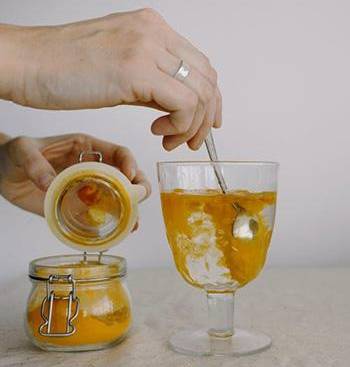 When you search for natural remedies that help reduce blood clots and prevent stroke, turmeric is usually included in all source materials. That is because turmeric contains curcumin, which acts as an anticoagulant. Curcumin is turmeric’s most active ingredient that stops coagulation or clotting factors, thereby, preventing blood clots to form.
When you search for natural remedies that help reduce blood clots and prevent stroke, turmeric is usually included in all source materials. That is because turmeric contains curcumin, which acts as an anticoagulant. Curcumin is turmeric’s most active ingredient that stops coagulation or clotting factors, thereby, preventing blood clots to form.
How to use it: One of my favorite turmeric recipes is making turmeric gold milk. It’s very easy, and it contains a lot of wonderful ingredients that blend well for a delicious drink.
Ingredients:
• 2 tsp ground turmeric
• 2 cups coconut milk
• 1-2 tbsp honey
• ¼ ground cinnamon
• Black pepper to taste
• Optional additions: 1 tsp vanilla, ½ tsp cardamom, ¼ tsp cayenne pepper, and nutmeg
Steps:
Mix all ingredients in a saucepan on medium heat. Bring to a simmer and transfer to a blender. Blend until you get a frothy and thick consistency.
You can enjoy this golden drink any time of the day, every day!
Ceylon Cinnamon
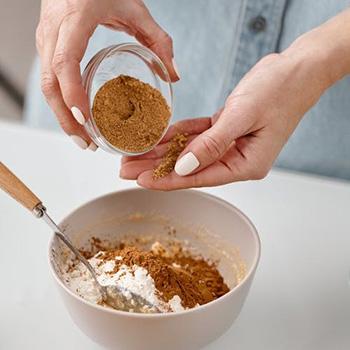 Cinnamon has anticoagulant properties brought about by its coumarin content. Cinnamon also helps lower blood pressure levels. When high blood pressure occurs, the arteries that carry blood and oxygen to the brain may burst or get blocked resulting in a stroke.
Cinnamon has anticoagulant properties brought about by its coumarin content. Cinnamon also helps lower blood pressure levels. When high blood pressure occurs, the arteries that carry blood and oxygen to the brain may burst or get blocked resulting in a stroke.
How to use it: The best way to add cinnamon to your diet is to sprinkle it on your foods and drinks. Currently, there is no specific dose set to how much cinnamon you can take each day. However, you need to be aware that too much coumarin can also be harmful to your health. Some experts recommend having ½ to 1 tsp of cinnamon per day as the safest dose.
Garlic
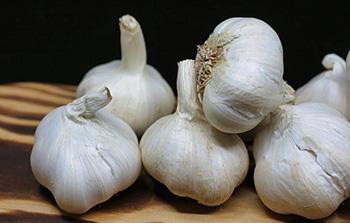 Most of our dishes contain garlic. This amazing herb is a natural remedy that boasts of antibiotic and antimicrobial properties. Little did everyone know that garlic also has anti-thrombotic properties. This means that it contains a substance that helps prevent blood clot formation.
Most of our dishes contain garlic. This amazing herb is a natural remedy that boasts of antibiotic and antimicrobial properties. Little did everyone know that garlic also has anti-thrombotic properties. This means that it contains a substance that helps prevent blood clot formation.
How to use it: If you take raw garlic, the recommended dose for adults is 4 grams. That is tantamount to 1 to 2 cloves. You may also add garlic to your dishes when cooking.
Celery
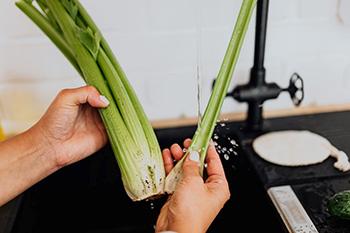 Celery helps in promoting healthy blood flow. It actually contains properties that promote blood clotting since it has Vitamin K. However since celery also contains coumarin, it makes an excellent blood thinner as well. Thus, a warning is given when you are taking anticoagulants such as warfarin. Adding it to your diet when taking anticoagulant medications may increase your risk for excessive bleeding. So make sure that you talk to your doctor first before using celery as a natural remedy to reduce blood clots and the risk of stroke.
Celery helps in promoting healthy blood flow. It actually contains properties that promote blood clotting since it has Vitamin K. However since celery also contains coumarin, it makes an excellent blood thinner as well. Thus, a warning is given when you are taking anticoagulants such as warfarin. Adding it to your diet when taking anticoagulant medications may increase your risk for excessive bleeding. So make sure that you talk to your doctor first before using celery as a natural remedy to reduce blood clots and the risk of stroke.
How to use it: I personally like eating celery raw. I simply chop some of it and add it to my vegetable salad. However, one way to maximize the benefits of celery is to make celery juice. Cut the base so that you can separate the stalks. Wash the stalks individually to make sure they are clean. Put one stalk of celery one after the other in a juicer. It is best to drink the juice immediately. But if you want to keep it, you can place it in a sealed mason jar in the fridge for up to 2 days.
Sunflower seeds
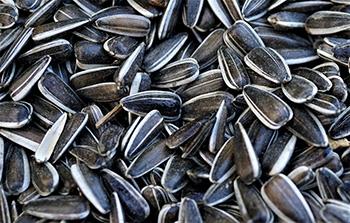 Sunflower seeds are rich in Vitamin E. Vitamin E helps reduce blood clots by widening blood vessels to keep blood from clotting. However, excessive Vitamin E intake is prohibited since it can cause excessive bleeding by interfering with the action of Vitamin K during blood clotting. To help control Vitamin E intake, experts recommend consuming Vitamin E from natural sources such as sunflower seeds.
Sunflower seeds are rich in Vitamin E. Vitamin E helps reduce blood clots by widening blood vessels to keep blood from clotting. However, excessive Vitamin E intake is prohibited since it can cause excessive bleeding by interfering with the action of Vitamin K during blood clotting. To help control Vitamin E intake, experts recommend consuming Vitamin E from natural sources such as sunflower seeds.
How to use it: The best way to include sunflower seeds in your diet is to use them as toppings in your salads. You can also use them in your pesto or taco recipes. Baked goods from bread to muffins also benefit from the addition of sunflower seeds.
Cayenne peppers
Capsaicin is present in cayenne peppers. This substance helps remove lipid deposits that cause the arteries to narrow. It also dilates arteries as well as blood vessels, which in turn remove blood clots. Furthermore, cayenne peppers are known to reduce blood pressure levels while improving circulation.
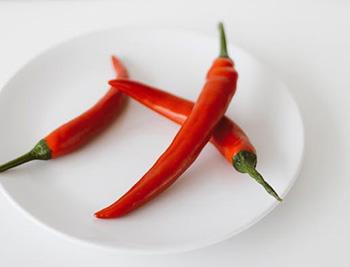
How to use it: You can simply add cayenne to your dishes as a spice. Or you can make a homemade cayenne pepper sauce so that you can use it whenever you want some spicy addition to your recipes. This sauce recipe also includes garlic. Combining these two amazing herbs will give you a potent blood clotting remedy.
Ingredients:
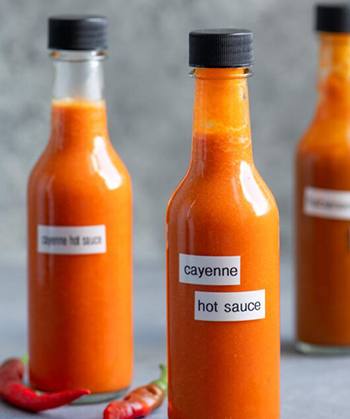 • 280 grams cayenne chili peppers
• 280 grams cayenne chili peppers
• 5-6 garlic cloves
• ½ cup white wine vinegar
• 1 tsp salt
Steps:
1. Finely chop cayenne peppers and garlic cloves. Add all ingredients to a pot.
2. Bring to a boil, and reduce heat to low. Simmer the mixture for 20 minutes.
3. Lightly cool and transfer to a blender. Blend the mixture until desired consistency is achieved.
4. Strain the sauce using a fine sieve for a thinner sauce. But if you want a thicker sauce, then you can leave it as is.
5. Pour into bottles with a cover.
This can last for a few months when stored in a fridge. Just be sure to keep the acidity level around 4 or 4.6. Otherwise, it’ll spoil easily.
Ginger
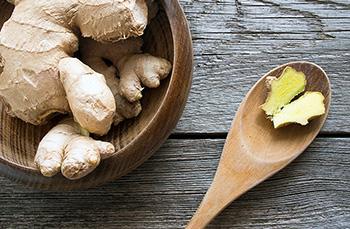 The salicylates found in ginger help prevent blood from clotting. This natural acid is also found in aspirin, which makes the drug a potent blood thinner. Ginger also reduces inflammation while relaxing the muscles. Hence, you are assured of many health benefits when taking this herb.
The salicylates found in ginger help prevent blood from clotting. This natural acid is also found in aspirin, which makes the drug a potent blood thinner. Ginger also reduces inflammation while relaxing the muscles. Hence, you are assured of many health benefits when taking this herb.
My favorite way to consume ginger is through ginger tea. Some don’t like it, however, due to the strong taste. But you can easily adjust it to your preference. If you still do not like to add ginger tea to your daily routine, then you may consume ginger by adding it to your cooking recipes.
Ingredients:
• 1-inch chunk of unpeeled but cleaned ginger, sliced, and cut into pieces
• 1 cup water
• Optional addition: 1 cinnamon stick or 1-inch fresh turmeric cut into pieces
• Optional addition: 1 tsp honey or maple syrup, and 1 thin slice of lemon
Steps:
1. In a saucepan heated on high, put water and add ginger along with either cinnamon or turmeric.
2. Bring to a simmer. Reduce heat to a gentle simmer for 5 to 10 minutes depending on how strong you want your ginger tea to be.
3. Remove from the pot and run through a sieve.
4. Add lemon with honey or maple syrup, if desired.
You can make a huge batch of tea and store it in a refrigerator for 4 days.
Blood clots are dangerous as they may lead to stroke. But why suffer from it if you can prevent it from occurring with natural remedies? Natural remedies have been used since ancient times, so their effectiveness has been tested and proven for thousands of years already. However, it is still best to consult with your doctor since some natural remedies can interact with the drugs you are already taking. Consult and be safe!
You may also like:
 8 Effective Home Remedies to Treat A Heat Stroke
8 Effective Home Remedies to Treat A Heat Stroke
If You See This Plant in Your Backyard, Don’t Step On It (Video)
How To Treat Varicose Veins With Chestnuts

Due to my cancer treatments almost 3 years ago, I have had to be on blood thinners due to the blood clots that formed in my legs due to some of the treatments. My question is, can I use the quantity recommendations in your article as noted with the use of blood thinners? I would greatly like to reduce or rid myself of them in the near future if possible. Would appreciate your insight. Thank you.
While the BE FAST guide is a good GUIDE of indications of a stroke and the need for medical care, BE FAST is NOT a guarantee of having a stroke. I speak from experience. For me it meant a brain tumor. Yes, it still meant medical help was needed, but a stroke is not the only possible explanation or answer for these symptoms and should never be advertised as the only explanation.
thankyou so much for your generous sharing o f precious knowlege.
I have your book about herbal remedies and i look forword to any , and all information , you share to help humanity help itself.
A potent blood thinner combination is Krill Oil + Garlic Oil + Olive Oil, you can add any of the above to increase the effect & remember that nose bleeds are very common.
Thanks for such informative articles .. Blessings
I have bought your book on lost herbal remedies. I love love love it. It is so informative and complete. Hoping to never need allopathic medicine.
Here’s an experiment I tried after quitting Plavix for stents after four years and no restentnosis, (and a pacemaker for VFib 24 years ago). That blood thinner was ruining the quality of my life, small cuts, hemorrhoids, scratches, gum bleeding etc. bleeding longer than usual, and terrible bruises that took forever to heal like scratching my arms all the time. So I quit. What I did do was at first was stopped the Plavix. I tried an interesting experiment. When I was on the Plavix a small cut took about 10-14 minutes of compression or longer to make the bleeding stop. When I was off the Plavix my blood clotted in 3-4 minutes. Then I took baby aspirin, the clotting time increased to about 5 minutes. Then I tried Turmeric (which is contra-indicative and not recommended with blood thinners because it makes your blood too thin) and aspirin daily and my clotting time increased to about 7-8 minutes. The turmeric really helped and because I have some random Atrialfib. I think it helps as a natural safe, less problematic alternative to prevent clotting, compared to the awful effect of blood thinners. The doctor who examined me after the stents were put in was board certified and Chief of Cardiology for Brookhaven Medical Institute. He was brilliant. I discussed the blood thinner problems and he said that if I didn’t have any restenosis with the stents that it would probably be Ok to stop the blood thinners after three to four years. He also said that doctors will never tell you to stop after prescribing them, mainly because of the legal implications and the only way you can stop is to tell your physician you are going to stop and that you understand the implications and risks. I’m 73 now. After going on the baby aspirin and daily turmeric regimen, and taking my metoprolol, statins, and eating heart healthy foods, and reading “Reversing Heart Disease” by Dr Dean Ornish my last treadmill test after 20 years+ revealed that my ejection fraction was better than ever. I think that means that whatever I’m doing is right. If you hate the problems associated with blood thinners my solution seems to be beneficial to me. You may want to discuss this with your physician who may be one of the new breed of doctors who are now considering a combination of allopathic and naturapathic treatments for heart disease.